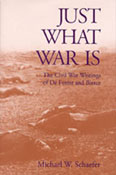Just What War Is
The Civil War Writings of Deforest and Bierce

- Author(s): Schaefer, Michael W.
- Series:
- Imprint: Univ Tennessee Press
- Publication Date: 1997-12-03
- Status: Active
- Available in Hardcover - Cloth: Price $36.00 | Buy Now
“This book’s value lies in is its attentive interrogation of the realistic combat writing of two major figures, De Forest and Bierce. Its added bonus is Schaefer’s clear, jargon-free prose—a relaxed and compelling read.”—Donald Anderson, editor of War, Literature, and the Arts: An International Journal of the Humanities
A stimulating study of two of the finest soldier-authors in American literature, Just What War Is explores the Civil War writings of John William De Forest and Ambrose Bierce. Michael W. Schaefer argues that among the many Civil War veterans who wrote memoirs, novels, and stories based on their own experiences in combat, De Forest and Bierce stand alone in their efforts to create an unromanticized portrayal of war in literature. While exploring issues of literary realism in general, Schaefer examines the struggle of these two major writers to represent the moral and human dimensions of combat.
De Forest and Bierce, who both served as Union officers, wanted to correct mistaken ideas about war that they believed had been propagated by journalists, fiction writers, and historians. Writing from the vantage point of soldiers directly involved in battle, they developed a more accurately descriptive and realistic form of combat discourse in their memoirs and fiction. Drawing on numerous histories and psychological profiles of men in combat, Schaefer’s close readings of De Forest and Bierce confirm the validity of these writers’ versions of literary realism.
Schaefer shows De Forest and Bierce moving beyond mere accuracy of detail to infuse their depictions of combat with their own visions of what it means to fight under fire. Their differences, Schaefer points out, emerge largely in their attitudes toward using other writers’ texts as guides, both during battle and in later writing about it. For his part, De Forest believed that history, properly used, enabled the soldier-writer to assimilate his experiences in a rational way. Thus he often portrayed characters who survive the stresses of combat by conducting themselves in accordance with what history had taught them about correct battlefield behavior. Bierce, in contrast, saw combat as an inherently irrational state and any attempt to rationalize it a lie. Eschewing stylistic borrowings from other war writers, Bierce favored protagonists whose destruction results from their efforts, drawn from their concepts of history, to impose a rational understanding on their experiences.
In its insightful discussion of how the Civil War changed the manner in which wars were described in literature, Just What War Is will broaden critical appreciation of both the place of war literature and the figure of the soldier-writer in American literary history.
The Author: Michael W. Schaefer is associate professor of English at the University of Central Arkansas. He is the author of A Reader’s Guide to the Short Stories of Stephen Crane.
